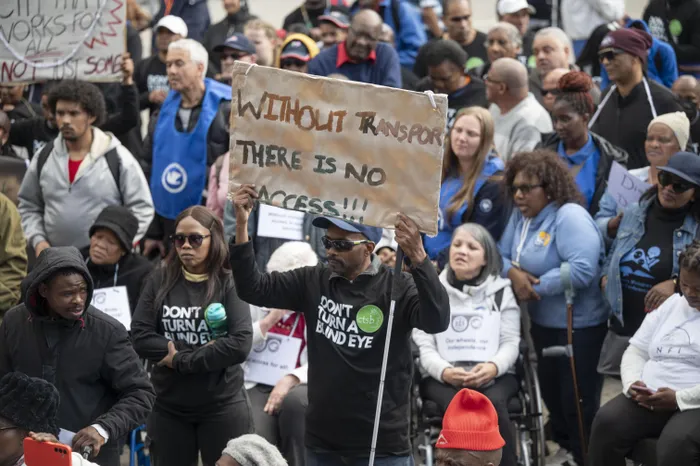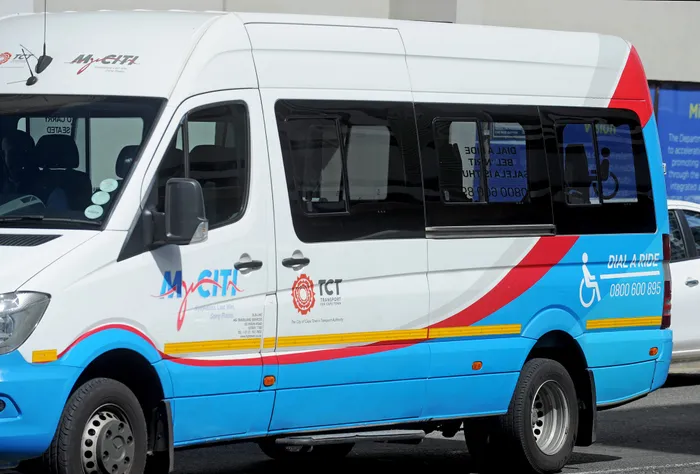
A large group of differently abled people and their supporters gathered at the Civic Centre in a peaceful protest on to raise their concerns with the city’s Dial-a-Ride service, a dedicated kerb-to-kerb service for people with disabilities who are unable to access mainstream public transport services. Earlier in August, the City of Cape Town announced that it would be changing the eligibility criteria for disabled persons who use the service due to budget constraints.
Image: Armand Hough / Independent Newspapers
The City has paused its decision to cut the Dial-a-Ride service for disabled people, which was expected to be suspended on Monday but will now run until October, after reaching a settlement with the Western Cape Network on Disability (WCND) on Friday.
The municipality's agreement with WCND was made an order of court by Acting Judge Wallis Roux.
The service has been in operation since the early 2000s, serving individuals, including the mentally disabled, visually impaired, and infirm, enabling their access to healthcare, places of worship, work, education, and community activities.

Dial-a-Ride is a public transport service by the City of Cape Town for people with disabilities.
Image: David Ritchie/Independent Newspapers (Archives)
Under the impending changes, the service will be severely limited to only wheelchair-bound individuals and those with severe walking impairments, and exclusively for transport to and from work.
The reduction is expected to affect more than 1000 vulnerable individuals. The City attributes its decision to an "unsustainable" R12 million annual shortfall.
The City intended to discontinue the vital service for residents who are blind, visually impaired, and people with other disabilities.
WCND Chairperson Dr Michelle Botha said following urgent legal action launched earlier in the week, they reached a settlement in the Western Cape High Court on Friday afternoon. As part of the settlement, the City has agreed to:
WCND said its legal team, the People’s Legal Centre, will submit a review application before October 10 to determine whether the City’s decision was lawful.
“The review process may take months, but during that time, Dial-a-Ride must remain fully active.
“This is a truly historic moment. As a community, we have shown our collective strength and made it clear that enough is enough,” Botha said.
“Our rights to equality, dignity, and participation in society must be respected. This victory sets a precedent: never again should decisions of this magnitude be taken without proper consultation with disabled people. It is also a reminder that collective action works, and that disabled people have the power to make a real difference,” Botha said.
The City said that to enable the court process to unfold in good faith, it will extend existing Dial-a-Ride services while the WCDN expedites its application.
“This extension provides an important window to engage in a broader conversation about the respective mandates and responsibilities across all spheres of government in the provision of specialised services such as Dial-a-Ride,” they said.
The City said it invests more in transport for persons with disabilities than any other metro in South Africa, but that it cannot shoulder this responsibility indefinitely without broader support.
“Delivering true inclusion will require collective effort from all spheres of government, employers and civil society — and not necessarily through funding alone.”
The City highlighted how the council adopted the Universal Access Policy for Accessible Transport, an internationally recognised framework that commits Cape Town to a mainstream system where all people, regardless of ability, can travel independently.
“While the City has operated Dial-a-Ride since 2002, its ambit has expanded significantly over time to what was first initiated, and it’s important to note that municipalities are not mandated to provide this specialised service,” they said.
“To keep it running, the City has funded Dial-a-Ride directly through the municipal rates account. In the absence of support from other spheres of government, the City has been forced to align the service with its original core objective of transporting wheelchair users and people with severe mobility impairments to and from work until mainstream public transport became universally accessible.
“For the service to continue to cater to non-employment related trips, the City hopes the court process may unlock funding needed from other organs of state with the constitutional mandate for services to persons with disabilities.”
Cape Times
Related Topics: